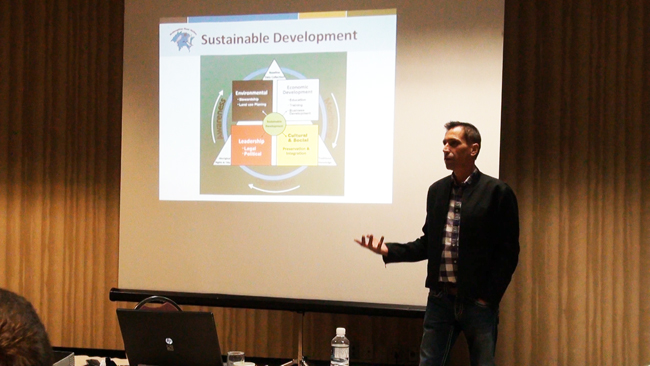First Nations not sharing in mining wealth

By Marlene Bilous
Anishinabek Nation workshops are creating more awareness among community members about how the mining industry is profiting from natural resources located on traditional territories.
The Union of Ontario Indians held two mining workshops in late March in the Northern Superior and the Lake Huron regions and a total of 40 participants attended.
“We hold all the resources on our treaty and traditional lands,’ said Deputy Grand Chief Hare, guest speaker at the Northern Superior Workshop. “Mining companies having been taking billions from our lands in resources without sharing the benefits. Now, we say ‘Talk to the First Nations or go home.’ Our kids are smart and we want to work towards having our kids becoming supervisors and not just handling shovels. We want to be involved from the get-go.”
The workshops addressed the five major options for First Nations to work with mining companies: Partnerships; Impact Benefit Agreements; Joint ventures; Equity positions; and becoming Proponents.
Peter Recollet of Wahnapitae First Nation and Michael Fox of High Impact Consultants addressed the participants on the various options and how they worked. They discussed their experiences in how first Nations could work effectively with mining operations.
Feedback indicated participants felt most strongly about the importance of four First Nations issues as Ontario implements new Mining Act regulations: recognition of Anishinabek and Treaty rights; a requirement for resource revenue- sharing; the need for environmental stewardship in mining; and the urgent need for more capacity at the First Nation level to handle the heavy burden of paperwork.
Environmental concerns dominated discussions, emphasizing that “water brings life to the family and community. Without water, there is no life.” Participants recommended that the mining industry quit “leaving a mess” when they finish operations.
Participants also suggested that government and mining companies should visit high schools and do presentations on the wide range of careers available in the mining and exploration industries and work to introduce apprenticeship at the high school level.
It was recommended that all First Nations inform the Minister of Northern Development and Mines that they have not been consulted on the new mining regulations as required by rulings of the Supreme Court of Canada. Ontario had a duty to consult with and accommodate First Nations where their Aboriginal and Treaty rights under Section 35 of the Constitution were impacted.


